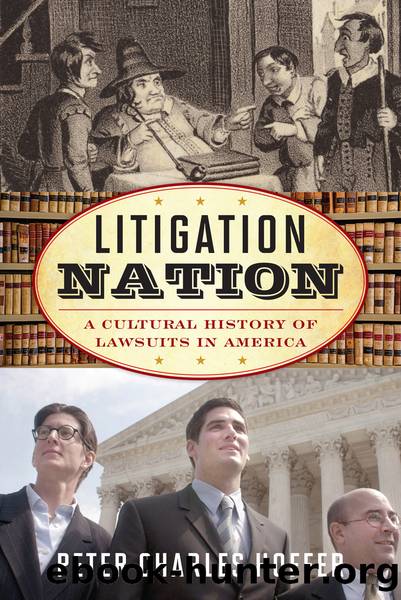Litigation Nation by Peter Charles Hoffer

Author:Peter Charles Hoffer
Language: eng
Format: epub
Publisher: Rowman & Littlefield Publishers
Published: 2019-07-18T00:00:00+00:00
Part II Litigation Defends Democracy
THE CIVIL WAR WAS A TEST of the litigation nation—would a law-abiding people survive the carnage? Would people once again sue rather than slay for vindication of their honor? The Civil War changed nothing and everything about litigation in America. Three amendments to the Constitution followed the defeat of the Confederacy, ending slavery; defining citizenship as national rather than based on residency in a state and requiring states to provide equal protection and due process for all American citizens; and, finally, denying to any state the authority to restrict the franchise on the basis of race. Reconstruction was a great experiment in legal reformation of a nation torn apart by slavery, but the war had not destroyed racism in the North or in the South, and Reconstruction would not achieve its legal aims until nearly another century had passed.
Nevertheless, in the face of what might have been the chaos of covert guerilla war, litigation defended democracy. Reconstruction opened the doors of the courts to new litigants—former bondsmen—and to new laws called “civil rights.” Even at the height of the Jim Crow regime of racial injustice from the postwar period through the 1950s, black litigants in the South were able to bring suits against whites and win in court.
Litigation reknit the previously warring sections. New legislation by the same Radical Republican majority in Congress that imposed occupation of the former Confederate states was welcomed in the South and brought many ordinary white people to the federal courts seeking relief for debts incurred during the Civil War. Industrialization, technological advances, and a revolution in legal practice (the rise of the law schools and the large legal firms) made litigation more complex and introduced new ideas like mass products liability and revised old ideas like equity. But litigants and their lawyers still brought and won cases against bigger adversaries. Business in federal and state courts boomed. More and more acts of Congress brought more and more Americans to the courts to vindicate rights and regulations that did not exist prior to 1865. Lawyers and their clients soon recognized that the litigation nation had not only survived the civil strife; it defended American democracy in new and potent ways.
For, what did many of these cases have in common? They were brought by ordinary men and women to assert their right to participate in the economic and social life of the restored Union. They were shareholders, farmers and laborers, and financiers and the suckers they fleeced. Litigation was as close to the great leveler in the new democracy as one could find. When great economic downturns descended on the land, the dispossessed again went to court to stave off foreclosure of homes and loss of jobs. After two world wars, blacks and whites joined in litigation to topple the barriers of racial segregation. In products liability cases, the courts were once again the place where ordinary people harmed by the products they bought and trusted could present their claims to restitution.
Download
This site does not store any files on its server. We only index and link to content provided by other sites. Please contact the content providers to delete copyright contents if any and email us, we'll remove relevant links or contents immediately.
2010-The City & the City by China Miéville(1992)
Anatomy of Injustice by Raymond Bonner(1667)
That Every Man Be Armed by Stephen P. Halbrook(1582)
ADHD on Trial by Michael Gordon(1576)
Injustices by Ian Millhiser(1499)
You Don't Own Me by Orly Lobel(1446)
Tell by Major Margaret Witt(1442)
Course Correction by Ginny Gilder(1409)
Broken Scales by Joel Cohen(1353)
Without Copyrights by Spoo Robert(1348)
A Vast Conspiracy by Jeffrey Toobin(1328)
First by Evan Thomas(1285)
J by Howard Jacobson(1259)
A Religious Orgy in Tennessee by H.L. Mencken(1253)
The Run of His Life: The People v. O. J. Simpson by Jeffrey Toobin(1216)
A Triumph of Genius: Edwin Land, Polaroid, and the Kodak Patent War by Ronald K. Fierstein(1203)
A History Of Thailand by Baker Chris(1194)
John Wayne Gacy by Judge Sam Amirante(1115)
Law 101: Everything You Need to Know About American Law, Fourth Edition by Jay Feinman(1103)
